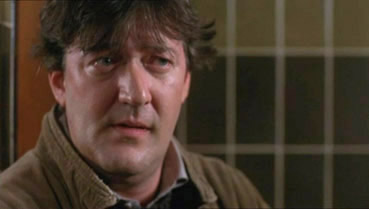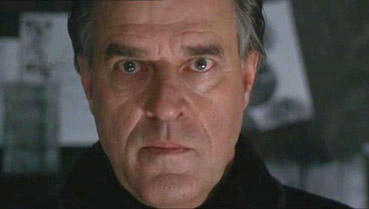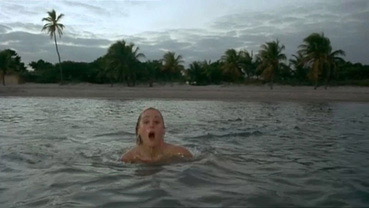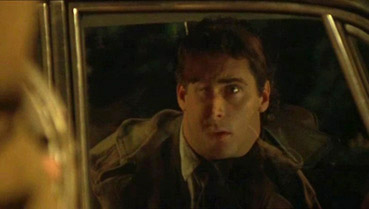"Truth, in matters of religion, is simply
the opinion that has survived." |
Oscar Wilde |
For those of you who know who Stephen Fry is, skip to the middle of paragraph three. What follows in paragraphs two and a half is a bit of an appreciation...
Stephen Fry is something of a singular hero in this household. His appeal crosses generations, sexes, sexual persuasions and it seems, intellectual capacities. He encourages the acceptance and promotion of intelligence in the media in an age of vapidity and the almost constant celebration of idiocy. His novels and non fiction make long car journeys preferable and not tedious and of course, his Harry Potter readings are another version of the J.K. juggernaut far from the computer generated eye-poppery of the movies and all the better for it despite my sneaking and growing regard for Warner Brothers' burgeoning cash cow. He promotes intelligence in his broadcasting (QI being the obvious example) and his two two-part series on manic depression and AIDS were justly hailed as significant television. The scene of his praising the bravery and wisdom of a young woman in the latter series stays with me as an example of kindness and honesty that truly moves you (and the recipient was glowing).

Let's not forget his immortal Lord Melchett in Black Adder ("Meeeh!") or his work with the now House and the then Laurie half of Fry and Laurie. I've not seen his Norfolk based drama, Kingdom (a time issue not an avoidance one) and know him indirectly to be something of a workaholic. His series on visiting every state in the US has just started on British TV and his erratically published Podgrams are always worth a listen. His appearance on Room 101 (a show where celebrities are invited to toss their pet hates into oblivion) convinced me that if it weren't for his bi-polar disorder, he'd be the perfect leader of countries. He just has that wisdom that comes with being well read and specifically smart as a whip. He's also a Mac nut and an ex-friend of Douglas Adams. His programme in the Who Do You Think You Are strand (more celebrities, this time finding out about their ancestors) was terribly moving. It turned out that a large percentage of his great-relatives – his background is Jewish but I think he's personally on the Darwinian bench – were victims of Nazi atrocities in Auschwitz.
So being this ubiquitous, you'd think he'd have conquered movies. Well, selective is a very good word for the Fry movie oeuvre. He knows his thespianic limitations, shall we say. From memory I cite some key performances. His 'gay man with AIDS invites mates for a rollicking Big Chill 'homage'', Peter's Friends was okay even if it did showcase his utter hatred of and despair at having to dance. His Wilde was excellent mainly because Fry has a real affinity with the beleaguered and eminently quotable Irishman. He was effective as the liberal TV producer in V For Vendetta and in my head he stayed well within Fry-ish roles (actors are cast to be convincing as characters and Fry's physical presence is quite specific. No, that's not a synonym for 'fat'. He's a big man, yes but he used to be whippet thin as a youngster. It can happen to any of us). But I was concerned that he wouldn't manage to convince in a role clearly so very far from his safety net. Well, actor and director Jeroen Krabbé didn't think so and cast him as the lead in The Discovery Of Heaven.
Released around 9/11 which couldn't have helped its box office one bit, Fry starred as Otto Quist in a very interesting – if odd – big budget (for Holland) movie about God wanting his Ten Commandments back, a sort of raiders of the lost ark with corduroy elbow patches. I can't tell you how long I equivocated over the capital 'G' or lowercase 'g' for God... My Dutch friends tell me this is a significant book in Holland (hence the handsome treatment) and it's apparently knocking on Tolkein's door for size of tome award that reminds me of a delightful joke about book four, The Goblet of Fire (the longest Harry Potter volume). Apparently a German reader said of it "I couldn't pick it up!"

So a lot was resting on Krabbé's casting. Onno goes from an idealistic young heterosexual scamp in his thirties to a desolate, stroke-victimed man in his late forties (Fry was 43 at the time of shooting) in the movie and bless me, Fry, openly gay, does a rather good job at being a little more girl oriented. I'm not condoning the silliness that dictates that actors must keep to their own sexual bias. I mean it works just as well the other way around (William Hurt, Tom Hanks et al). It's just that Fry, over the years, has never shown a trace of heterosexuality so this was a real test of his acting abilities. I saw the movie in Holland in 2001 and according to those who read the book, the movie is a pale net curtain of a narrative that's literary velvet and much heavier in tone. I've not read the book so only have the movie as reference. Well, with this subject matter you don't expect me to go easy, do you? We're in the realm of The Celestine Prophecy here only much dafter and that's saying something. In fact it's saying something almost inconceivable.
You're out on a trembling limb already if the premise of your big budget movie is that God wants his stone tablets back. Jesus! Heaven is real, you see and it's in the stars and its design taken from Piranesi's prison prints, is very atmospheric, overwrought iron gothic. Those in heaven (angels, one presumes) all dress like monks and heaven help me, Maureen Lipman's in charge! Yes, BT herself. The role of Gabriel is played by director Krabbé and God doesn't make an appearance which I guess is just as well. A younger angel has to engineer human affairs so that the original Ten Commandments are returned to God. He's already caused the two world wars to do this. The tablets remain earthbound. Why does God need them back? Did He lose them in a bet with Thor? Is Odin winding Him up about the wisdom of coveting his neighbour's ox? The fact that the angels talk of DNA and cloning puts a large spoke in the wheel of verisimilitude. Uh, science, OK. Angels? Well, let's just accept that silliness.
So forgoing the power of God to just summon the fecking tablets back to heaven with a click of celestial fingers, our young angel has to make three people fall in love and beget a child (oh, heavenly language) who has the spiritual and practical smarts to (a) know how to unlock medieval locks, (b) know where the bloody tablets are (not even Indiana Jones knew that by instinct, no Staff of Ra for our young Quinten) and (c) know where the spiritual post box was. I have a real problem with unearned awe in movies. When characters just 'know' things, it robs the narrative of any real discovery. Hey, that's in the title. You'd think they'd be a little more respectful. Once heaven is discovered in the movie, the discoverer has a fecking meteorite dropped on him after Maureen Lipman has a hissy fit. This ridiculous moment is conveyed to Fry's Onno who accepts it as if it were a Chiswick bus accident.

So the joy of the movie is in the hands of two men who become friends because of a heavenly hubcab/raven intervention (there are a lot of very well trained ravens in this movie, Heaven's emissary though I can't figure out why) and the underlying irritation is in the all pervading idea in popular culture that life has meaning and that some of us are destined to perform certain tasks that will have lasting significance. Purpose is just a misspelled dolphin and we should live knowing that. To quote Brad Pitt via Chuck Palahniuk (and who hasn't?) "We are decaying organic matter, all part of the same compost heap. We are the all-singing, all-dancing crap of the world." So if we accept that Heaven's religious silliness is simply religion's silliness, let's focus on the performances.
Stephen Fry plays Onno with a real joie de vivre. The younger, idealistic man is an Amsterdam based intellectual (so far, so Fry) who is trying to decipher a language (Etruscan) written on a stone a good while ago. For some reason this pursuit takes a near lifetime to achieve and ends up as a sort of stone-mail from God. Max Delius is a serial womaniser and an astronomer who thinks (for some reason, unexplained) that he has discovered a possible location for 'Heaven'. Duh. Played by the original modern movie Willoughby from Sense and Sensibility, Greg Wise, the character is deceitful but honestly self-aware, like a scorpion explaining to all sexual partners that he may have to sting them because that's his nature. Wise is a good actor, a man who uses his body when necessary and eyes when even more. Put next to Fry, he's Adonis (no disrespect, Stephen) and that pairing makes them utterly compelling. Here's the brain and here's the body and they want to spend time together as friends. It's a good feeling that this partnership exists, that it may exist. The writing is also rhythmic between the two and you can spot a relationship blossoming when one is able to insult the other and it is simply accepted. But of course, trouble ensues.
Flora Montgomery plays Mary – no, sorry. She plays Ada, the love of both men's lives. Smitten by Wise's lethal good looks and charm (heavenly intervention again, those bastards), she eventually realises his utter unsuitability as a life partner. She moves towards Fry's Onno because he offers her more than a physical penetration and before you know it, she has two men in thrall to her charms, two men who manage to (with heavy and unsuitable prompting – but then when has a man needed prompting to attain an orgasm?) impregnate her on the same day. Along comes the baby, Quinten, with Fry believing it his and Wise offering to look after it after something unpleasant occurs.
Quinten grows up into a teenager with a fair haired centre parting and lapis lazuli blue eyes that are so striking you believe he may have been cast because of them. It's his mug that's the prevalent marketing image. I hope this isn't taken the wrong way because he's perfectly serviceable as a heavenly engineered child but he's so text book pretty that his looks work against the character because every part of a boy of that age is played by a specific physical type in movies these days. But I guess if he's supposed to be angelic... His father has sent himself away in grief after another death and it's left to Quinten to suffer the losses around him (he has death premonitions which are essentially sepia zoom crash cuts) and be true to his destiny and come over all celestial in Rome.

The Discovery Of Heaven is a slice of hokum that is enjoyable for some nicely judged performances, specifically from Wise and Fry. Krabbé's role as Gabriel is fairly thankless (at one time boasting of his sexual prowess, knocking up Mary in one hit – he actually says words to that effect, bloody hilarious) but in his role as director, he's acquitted himself very nicely. There are touches all through the film that would have been much more effective if it served a narrative a little more robust, a little less deliciously silly. There is a wonderful touch after establishing that there are to be two men who will effectively father Quinten and Krabbé puts two halves of both men's faces together in a car window just for an instant. The film is full of little flourishes like this and they are always welcome. I will remember the film for Maureen Lipman's urgent and earnestly silly "Kill him!" and the subsequent fall of the bidden meteorite. Just wonderfully bonkers.
Here's the oddest thing. The movie starts in anamorphic 2.35:1 but only the pre-title sequence and title. After that we zoom in to 1.85:1 or 16:9. I can't understand this at all. So I won't go on about it. The picture quality is generally good but there is noticeable grain throughout especially in the darker areas of the frame. Overall contrast is pretty good.
The 5.1 soundtrack is subtle and very pleasingly smooth. The surround speakers are never tested but just subtly wash over you with atmosphere.
1. Extra Visual Effects Material (6' 37")
Uh... This is essentially the live action material of the composited effects shots of Heaven and then the added composite and the final shot. It is distinctly dull in and of itself despite my mania for special effects knowledge and for completists only. It comes with time code and negative key code numbers! Knock yourselves out.
2. Deleted Scenes (11' 32")
The titles of the scenes should tell you what you need to know. None of the scenes included in or excluded from the feature would change the overall effect of the movie significantly but "Egg Throwing" does advance Max's utterly self centred character (when it comes to women). "Make yourself come..." indeed.
a. Max's Office
b. Egg Throwing
c. Wedding Reception with Max's VO
d. Max and Sophia make love
e. After the Meteorite
f. Confessional Booth intercut with Ada's death
g. Morning in Jerusalem
h. Quinten's Backpack
i. Onno's Stroke
3. Trailer (2' 08")
Shown in the aspect ratio 1.85:1, the trailer is a fairly good representation of what you're in for. But the promise of action and blue-eyed pretty boys is still the marketing order of the day.
Stephen Fry fans will find The Discovery Of Heaven an oddity but a reminder that he is an actor as well as the belisha beacon of intellectual broadcasting in the UK. The relationship between Fry and Wise is the glue that keeps the movie tethered to an audiences' identification and the narrative, despite its silliness, is involving enough to get you through the extraordinary religious quackery. Have a look. The sillier it gets the more eye widening it appears. That's not necessarily a bad thing.
|